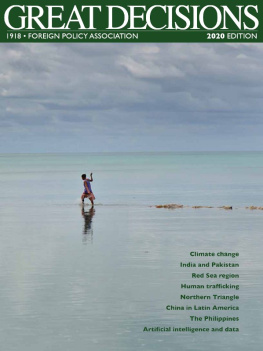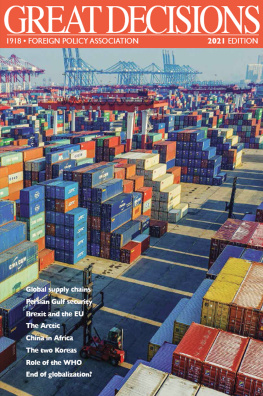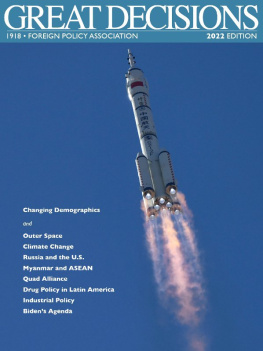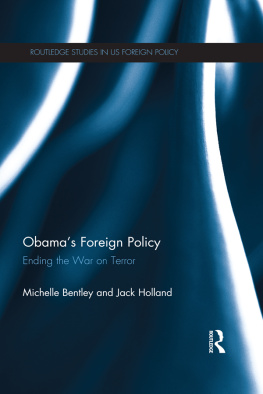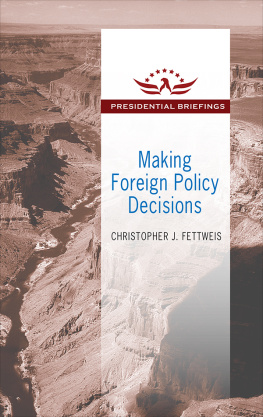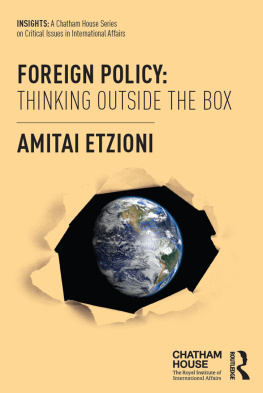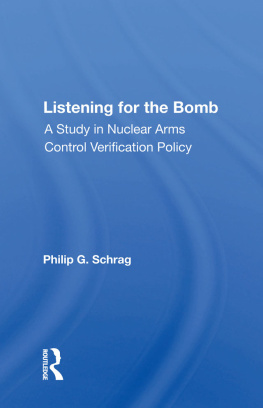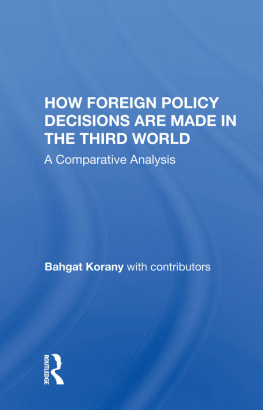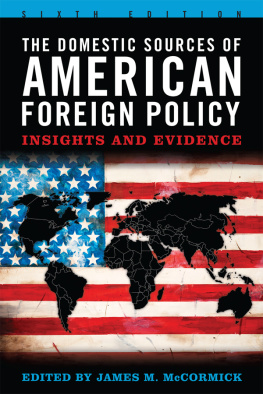Foreign Policy Association - Great Decisions 2020
Here you can read online Foreign Policy Association - Great Decisions 2020 full text of the book (entire story) in english for free. Download pdf and epub, get meaning, cover and reviews about this ebook. year: 2020, publisher: Foreign Policy Association, genre: Politics. Description of the work, (preface) as well as reviews are available. Best literature library LitArk.com created for fans of good reading and offers a wide selection of genres:
Romance novel
Science fiction
Adventure
Detective
Science
History
Home and family
Prose
Art
Politics
Computer
Non-fiction
Religion
Business
Children
Humor
Choose a favorite category and find really read worthwhile books. Enjoy immersion in the world of imagination, feel the emotions of the characters or learn something new for yourself, make an fascinating discovery.
- Book:Great Decisions 2020
- Author:
- Publisher:Foreign Policy Association
- Genre:
- Year:2020
- Rating:3 / 5
- Favourites:Add to favourites
- Your mark:
- 60
- 1
- 2
- 3
- 4
- 5
Great Decisions 2020: summary, description and annotation
We offer to read an annotation, description, summary or preface (depends on what the author of the book "Great Decisions 2020" wrote himself). If you haven't found the necessary information about the book — write in the comments, we will try to find it.
The Great Decisions briefing book features impartial, thought-provoking analyses on eight issues of concern to U.S. policymakers today. Written by carefully selected experts, each article offers policy options for U.S. officials as well as questions and tools for discussion.
Great Decisions 2020 — read online for free the complete book (whole text) full work
Below is the text of the book, divided by pages. System saving the place of the last page read, allows you to conveniently read the book "Great Decisions 2020" online for free, without having to search again every time where you left off. Put a bookmark, and you can go to the page where you finished reading at any time.
Font size:
Interval:
Bookmark:
GREAT
DECISIONS
Editorial Advisory Committee
CHAIRMAN
David B.H. Denoon
Professor of Politics and Economics New York University
Barbara Crossette
Specialist on the UN and South-Southeast Asia
Michael Doyle
Harold Brown Professor of International Affairs, Law and Political Science; University Professor Columbia University
Christine E. Lucas
Chief of Operations Leadership Florida, Tallahassee
Lawrence G. Potter
Director of Research and Publications of The Gulf/2000 Project Adjunct Associate Professor of International Affairs, Columbia University
Thomas G. Weiss
Presidential Professor of Political Science The CUNY Graduate Center
Karen M. Rohan
FPA Editor in Chief, Ex officio
Foreign Policy Association
Henry A. Fernandez
Chairman of the Board of Directors
Noel V. Lateef
President and CEO
EDITOR IN CHIEF
Karen M. Rohan
ASSISTANT EDITOR
Matthew Barbari
EDITORIAL CONSULTANT
Ann R. Monjo
PHOTO EDITOR
Cynthia Carris Alonso
MAPS
Robert Cronan
Lucidity Information Design, LLC
EDITORIAL INTERN
Franco Lopez
J ohn F. Kennedy observed that the ignorance of one voter in a democracy impairs the security of all. While President Kennedy was indulging in hyperbole, there is little doubt that leaders who make bad foreign policy decisions often trigger costly, long-term consequences for the polity as a whole.
In the course of the Foreign Policy Associations daunting first century, millions of Americans have worked with FPA to seek a more profound understanding of world affairs. The common purpose bringing us together has not been to impose a particular view but to consider and weigh many views. At the heart of this citizen effort lies the conviction that America must continue to frame its policies by the processes of democracy. Even the best policy cannot be sustained unless the public, whose interest it ultimately must serve, approves of the policy.
At FPA, we do not believe that global issues are too complex for citizens to understand if clearly briefed. Not to a limited circle, therefore, but to all, FPA extends an open invitation to join in a collective dialogue on our future in an interdependent world.
On the local news, an emergency room physician at Mount Sinai Hospital in New York City recently told the interviewer in a story on global pandemics, I have to keep abreast of world news to do my job. This is no less true for those in education, business, banking, law; indeed, almost every profession. It is also true, if we are to be good citizens. Every generation has to exercise the responsibilities of citizenship by staying informed. This is key to sustaining our democracy.
In this election season, we would do well to heed the warning of President Franklin D. Roosevelt: Democracy cannot succeed unless those who express their choice are prepared to choose wisely. The real safeguard of democracy, therefore, is education. And Thomas Jefferson: Educate and inform the whole mass of the peoplethey are the only sure reliance for the preservation of our liberty.
In addition to being informed, Jefferson believed that citizens in a democracy had to be virtuous: The minds of the people are to be informed by education of what is right and of what is wrong; to be encouraged in habits of virtue and to be deterred from those of viceThese are the inculcations necessary to render the people a sure basis for the structure and order of government. A virtuous society would escape corruption, an affliction endemic to many governments and one that undermines trust, which is at the very foundation of good governance.
Jeffersons views on inclusive governance represent a radical departure from the way elites conducted themselves in the past and continue to do so in many parts of the world. The edification of the masses necessarily dilutes power concentrated among the few. The Founding Fathers were prepared to subsume their own interests to the good of the Nation.
John Meacham writes in his magisterial book, The Soul of America; The Battle for our Better Angels, that to know what has come before is to be armed against despair. Arthur Schlesinger, Jr., observed:
History is to the nation much as memory is to the individual. The individual who loses his memory doesnt know where he came from or where hes going and he becomes dislocated and disoriented. Similarly, a nation that forgets its history is disabled in dealing with the present and the future.
The neglect of history has incalculable consequences. That significant numbers of millennials favor leadership by a strongman is a tragic example of a lapse of knowledge of history.
Our schools must be held accountable for their deficiencies in teaching history, civics and global studies (HCGS). While we have initiatives to encourage education in math and science (STEM), as well as standardized testing that rewards schools that teach subjects like literature well, there is no system in place to incent schools to put more emphasis on HCGS. This is inexcusable, resulting in graduates who cannot differentiate democracy from dictatorship; who overlook that the United States Constitution comprises some of the most exceptional rules of government ever written; and who cannot even place America on a world map.
It is high time, in the words of FPA Director Peter F. Krogh, that we replace the valor of ignorance with the valor of knowledge.
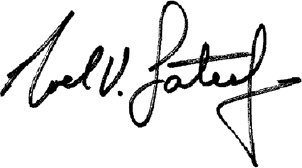
Noel V. Lateef
President and Chief Executive Officer
Foreign Policy Association
by Ronald J. Bee
RONALD J. BEEis the Director of the Hansen Leadership Institute at the University of San Diego. He lectures in international relations at the Oxford Study Abroad Program in Oxford, UK, and has served as the co-director of the University of California Roger Revelle Program on Climate Science and Policy
! Before you read, download the companion Glossary that includes definitions, a guide to acronyms and abbreviations used in the article, and other material. Go to www.fpa.org/great_decisions and select a topic in the Resources section. (Top Right)

A man rides riding a tricycle with plastic bottles to be recycled on a day of heavy pollution on December 1, 2015, in Beijing, China. Chinas capital and many cities in the northern part of the country recorded the worst smog of the year with air quality devices in some areas unable to read such high levels of pollutants. (LINTAO ZHANG/GETTY IMAGES)
I n the August 2019 Special Report of Scientific American, the lead story Sea Change: The Contest to Control the Fast-Melting Arctic, describes how nation-states have positioned themselves to exploit resources in the rapidly thawing north. Twelve years earlier on August 2, 2007, three Russian explorers descended 4,300 meters in a small submarine at the North Pole to claim new territory and planted a titanium national flag. When the submersible surfaced and the Russians boarded their nuclear-powered ice-breaker, President Vladimir Putin phoned the ship to offer his congratulations. While setting the flag amounted to a political stunt to bolster Russian morale during a worldwide recession, it also signaled a new era of competition between states more focused on acquiring national resources than cooperating to counter the international effects of climate change.
Next pageFont size:
Interval:
Bookmark:
Similar books «Great Decisions 2020»
Look at similar books to Great Decisions 2020. We have selected literature similar in name and meaning in the hope of providing readers with more options to find new, interesting, not yet read works.
Discussion, reviews of the book Great Decisions 2020 and just readers' own opinions. Leave your comments, write what you think about the work, its meaning or the main characters. Specify what exactly you liked and what you didn't like, and why you think so.

